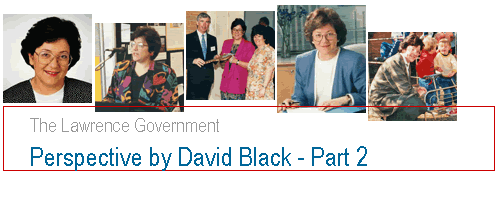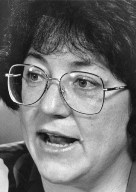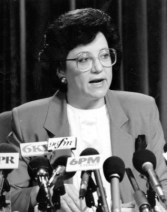
Dismantling WA Inc. and the appointment of the Royal Commission into the Commercial Activities of Government
Another major preoccupation of the Lawrence Government in its early days was to ‘dismantle the remaining components of WA Inc.’ With regard to government agencies this included taking steps to clear the losses of WA Government Holdings over a five year period and to dispose of the assets of the WA Development Corporation. During the term of the previous government Chief Justice Sir Francis Burt (who shortly afterwards was commissioned as WA Governor) had chaired a Commission on Accountability to report to the Premier. At the end of August 1990 the Lawrence government received the report which was prepared by prominent local QC (and future State Governor) Malcolm McCusker concerning the collapse of Rothwells and the failed attempts by the government and others to rescue the bank. As a consequence of the report a number of prosecutions were launched before the end of the year.

Curtin University Library. Carmen Lawrence Collection. Records of Carmen Lawrence. Carmen Lawrence speaking at press conference about W.A. Inc., 1990. CUL00005/3/75
In the wake of these reports, and after some consideration, on 19 November the Premier announced the establishment of a Royal Commission into the Commercial Activities of Government. Its brief was to investigate the WA Inc. dealings as well as allegations of bribery within the Stirling City Council. The wide ranging terms of reference included matters arising from the Rothwells collapse and the McCusker Report, central city transactions involving government agencies, the purchase by SGIC of shares in the Bell Group, various property and other transactions involving the GESB , SGIC, State Energy Commission of WA (SECWA) and WA Development Corporation, the agreement by SECWA for the purchase of natural gas from the North-West Shelf joint venturers, and deals involving the Teachers’ Credit Union. The three Royal Commissioners were named as retired High Court Judge Sir Ronald Wilson, retired Supreme Court judge Peter Brinsden and current Supreme Court Judge Geoffrey Kennedy. The report was due within twelve months.
1990–1991 budget and parliamentary affairs
In the Lawrence Government’s first budget, economies were made by not replacing many retirees from the public service and also by lessening the projected outlays on capital works. The Legislative Council was also the scene of a protracted struggle over legislation to transfer the WA Corporate Affairs Department to the new Australian Securities Commission. The opposition controlled upper house rejected the bill initially but under pressure from non-Labor and business leaders in the Eastern States, the Council backed down and passed the legislation at a special sitting on 27 December. Earlier Parliament had held a special sitting to celebrate the 100th anniversary of the State’s constitution and bicameral legislature.
Ministerial reshuffle and its aftermath—a minority government
The immediate political focus of 1991 was the ministerial reshuffle on 29 January which led to three ministers—Jeff Carr, Gavan Troy and Pam Buchanan—being replaced by Judyth Watson (as Minister for Aboriginal Affairs and Multicultural and Ethnic Affairs, portfolios previously held by the Premier) and two future party leaders—Eric Ripper (Community Services) and Jim McGinty (Housing, Construction, Services and heritage). The most rapid rise had been for McGinty who had only entered parliament in May 1990 in David Parker’s former seat of Fremantle. The Premier herself also shed responsibility for Public Sector Management and in a further reshuffle in February, Judyth Watson took responsibility for the Aged. The ministerial changes quickly produced a political fall out with Pam Buchanan resigning from the ALP to sit as an Independent while Jeff Carr went one step further by resigning his parliamentary seat of Geraldton. In the subsequent by-election, Geraldton was lost to the Liberals with a 25 per cent swing against the ALP. Left winger Ian Alexander also left the party to sit on the cross benches, meaning that when Parliament met in March, the Premier led a minority government. Labor had the guaranteed support of only 27 of the 57 members in the Legislative Assembly.
Nevertheless, during the following few months the government was only defeated once on the floor of the house, this being when the house voted to have the Swan Brewery demolished and the land returned to parkland: as it was, this motion was not acted on by the government. In addition, the government barely avoided a second defeat on a Liberal private member’s bill seeking to establish a reserve in the Hepburn Heights area. The land in contention was fifty three hectares of bushland in Padbury where there were plans to develop residential sites. Independent Liberal Ian Thompson voted with the government and the bill was defeated by one vote, allowing development to proceed. At the same time the government did decide to allow mining in a number of national parks and also excluded 4 per cent of the newly created Mt Lesueur National Park to allow Conzinc Riotinto Australia (CRA) to undertake coal mining in the area. 1991 also saw the hearings of the Royal Commission commence on 25 February with an investigation into the purchase of the Fremantle Gas and Coke Co by the State Energy Commission in 1986. In May the Commission moved on to the granting of licences relating to the Burswood Casino.
The Premier and the wheat farmers
The Premier also came under pressure from farmers in March 1991 with a claim that without a guaranteed minimum price many wheat farmers would not even attempt to plant a crop. Protestors organised a truck blockade of several access roads to Perth and dumped wheat at an unmanned US tracking station as a protest against US government subsidies to their wheat farmers. The Premier, acting on a task force recommendation, set a guaranteed price of $150 a tonne. The decision was criticised by federal Labor and non Labor politicians and several state Premiers but welcomed by the farming community.
Problems within the Liberal Party
On the other side of the ledger, there were also internal problems within the Liberal party arising from the resignation and death of former minister Andrew Mensaros in May 1991 and a subsequent struggle over Liberal endorsement for the safe Floreat seat.

Curtin University Library. Carmen Lawrence Collection. Records of Carmen Lawrence. Dr Lawrence at a press conference, 1990. CUL00005/2/49
Opposition leader Barry MacKinnon made a public appeal for party unity. However, after Michael Huston, with the support of prominent Senator Noel Crichton-Browne, was given the official endorsement, a number of prominent Liberals including former Minister Dick Old resigned from the party and backed Independent Liberal candidate Elizabeth Constable for the by election scheduled for 20 July. Further problems developed ten days before the by election when Upper House MLC Reg Davies resigned from the party to become an Independent, thus depriving the Liberal/National combination of their majority vote in the Legislative Council. Then came the Floreat polls in which Independent Elizabeth Constable polled almost 48 of the votes on the primary count and was easily elected on preferences, making her the first ever woman elected to the WA Parliament without party endorsement. In an eight sided contest, but without an ALP candidate, endorsed Liberal Michael Huston polled only 36% of the votes. The Greens and the Democrats polled 9% between them. In the later stages of the campaign, former leader Sir Charles Court intervened and was accused of meddling by his opponents. In the aftermath of these events the Liberal party held its annual conference at the end of July and former federal minister Ian Viner was elected as party president. With the party shown as lagging behind the Lawrence Government in the polls, Opposition leader Barry MacKinnon reshuffled his shadow ministry, giving his main rival Richard Court responsibility for Resource Development and Aboriginal Affairs. Relations between the Liberals and Nationals were relatively smooth but negotiations for a joint Senate ticket came to nothing.
ALP controversies
On the other side of the House in October the Lawrence Government experienced a further defection with the resignation of Morley MLA and Vietnam War veteran Frank Donovan. Thereafter, Donavon, along with Ian Alexander, formed a duo constantly accusing the government of abandoning both policy and principle. In justifying his defection Donovan referred to the decision by the Government (and by the State ALP conference) to support a land grant to Notre Dame University and also gave voice to his opposition to allowing mining in national parks, the acceptance of private power generation and the continued presence on West Australian soil of US defence facilities.
Another controversy affecting the government centred on an endorsement battle which saw MLC Garry Kelly demoted from ticket place number one to ticket place number three for the South Metropolitan region. Health Minister Keith Wilson, a former Anglican minister who had converted to Catholicism, also voiced strong objections to Labor’s policy on improving services for women seeking counselling on terminating pregnancies. The latter controversy placed Dr Lawrence in a difficult position given her personal support for legalising abortion. However she refused to override Wilson with any attempt to ‘decriminalise abortion at that stage’. She also did not intervene when Wilson vetoed moves by the Health Department to conduct a ‘safe sex’ publicity campaign.
Royal Commission hearings and legislative successes/failures
Meanwhile the slow progress being made by the Royal Commission led to the government agreeing to an extension of its deadline for submission to 30 June 1992 and the holding of first dual and then three simultaneous hearings by December 1991. By this time too, the main focus of the Commission’s attention had become the huge Rothwells inquiry and related issues such as the Kwinana petrochemical project and St George’s Terrace land sales. As the lengthy inquiry proceeded and more and more revelations came to light, criticisms of the nature and tenure of the Royal Commission proceedings began to abate. In Parliament itself the government’s loss of control in both Houses meant that less time was spent debating legislation and more time was spent on investigatory activities.
Additionally, the budget came under pressure from the acceptance of demands from the business community for reductions in land tax rates. The government also failed to secure the passage of its legislation providing for ‘one-vote-one-value’ electoral distribution but agreement was reached to hold a third referendum on daylight saving in April 1992. Other legislative successes included the passage of the long awaited Freedom of Information Bill and the requirement that bicycle riders wear approved helmets on all carriageways and dual-use paths. In another important first in December 1992 the State appointed its first Director of Public Prosecutions. Legislation was also passed to strengthen the Official Corruption Commission, at that time described as a ‘toothless watchdog’, and to empower the Commission to report to Parliament any obstacles to its pursuit of graft.
Harsher sentencing laws
The Lawrence Government came under strong community pressure to increase penalties for serious crime following the death of Margaret Blurton and her one year-old son on 25 December 1991. Both were killed in the course of a high speed police chase involving juvenile car thieves. At a vigil at Parliament House in early January 1992, Deputy Premier Ian Taylor committed the government to strong action and led to forthright debate on the issue of harsher sentences.
Legislation was foreshadowed which embodied indeterminate sentences at the Governor’s pleasure for repeat offenders convicted of violet crimes and a maximum twenty year sentence for car thieves held responsible for death or serious injury. In the course of debate the government was accused of proposing laws which violated United Nations human rights covenants. In response the government proposed a two-year sunset clause for each of the bills which in their final form embodied (a) for repeat offenders after an initial minimum term, six months additional terms to be reviewed regularly by a Supreme Court judge and (b) a maximum twenty year term for car thieves convicted of dangerous driving causing death.

Curtin University Library. Carmen Lawrence Collection. Records of Carmen Lawrence. Premier Carmen Lawrence working at her desk, 1992. CUL00005/3/58



